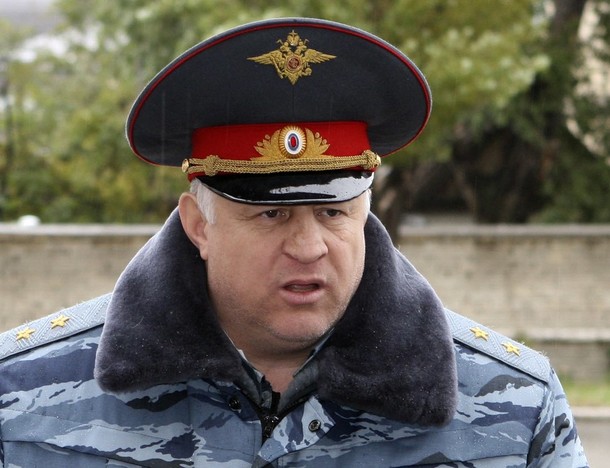
Assassination of Interior Minister Marks a new Level of Political Violence in Dagestan
Publication: Eurasia Daily Monitor Volume: 6 Issue: 110
By:

Dagestani Interior Minister Adilgerei Magomedtagirov was killed in broad daylight at the entrance to restaurant in Makhachkala on June 5. Even though Dagestan is known for political murders – and specifically the murders of top law-enforcement officials – it was the first time that an official of such a high rank was killed. Along with the minister, one of his deputies, Aburazak Abubakarov, was also killed and several other policemen were badly wounded in the incident.
On June 9 Russian President Dmitry Medvedev paid an unexpected visit to Makhachkala. He called the murder of the interior minister "the challenge for the authorities" and demanded the perpetrators of the crime to be prosecuted (Radio Echo Moskvy, June 9). The head of the Investigative Committee of Prosecutor General’s Office, Aleksandr Bastrykin, flew to Makhachkala along with specialists from Moscow to oversee the investigation (RIA Dagestan, June 5).
According to preliminary reports, at least two killers took part in the murder of Magomedtagirov and Abubakarov, which took place as they were attending the wedding of a colleague’s daughter. One of the killers reportedly fired a machine gun, while the other was a sniper. According to reports, the attackers used specific models of firearms that are used by the Russian security services. It took some time for the police to identify the type of weaponry used and the guns were not found the day after the killing (RIA Novosti, June 6), so the involvement of the security services in Magomedtagirov’s killing was one of the first versions to appear (Echo Moskvy radio, June 5). Two days after the murder, many of the killing’s technical details – for instance, the shooting positions of the killers – remained unclear (RIA Novosti, June 7).
The late Dagestani interior minister was known as a staunch fighter against the Islamists who often personally participated in security operations against the insurgents (Kommersant, June 6). In fact, the Chechen separatists’ website Kavkazcenter posted a Dagestani Islamists’ video warning for Magomedtagirov, that dated back to 2006. In that video Dagestani insurgents, spoke in Russian with a Dagestani accent (www.kavkazcenter.com, June 5). The involvement of the Islamists in the minister’s murder remains at this time one of the most likely explanations behind the assassination.
Adilgerei Magomedtagirov became Dagestan’s interior minister in 1998 and took an active part in the battle that took place when Shamil Basaev led Chechen-dominated Islamic guerrillas into Dagestan. After Basaev’s invasion was defeated and Chechnya itself became the arena of a long and bloody war, a battle with Islamists and separatists inside Dagestan also ensued. Magomedtagirov survived several attempts on his life over the past four years prior to his assassination.
Some sources have speculated that a specific person among the Islamic insurgent leaders in Dagestan organized the killing of Magomedtagirov (such as Ibragim Gadzhidadaev from the Gimry region, who has claimed responsibility for the assassination). Gadzhidadaev has been considered to be the leaders of the Gimry extremists. In an interview with Gazeta,ru Gadzhimurad Kamalov, a well known publisher and journalist in Dagestan, stated that it was Ibragim Gadzhidadaev who killed the minister (www.gazeta.ru, June 5). The Gimry region it should be noted represents a score of villages in the Dagestani mountains that were subject to a counterterrorist operation from mid December 2007 to the end of July 2008. Gadzhidadaev was never found during these extensive security operations.
At the same time, however, other sources believe the attack was too sophisticated to have been organized by the Gimry insurgents. Magomedtagirov also was disliked not only by the militants, but also by ordinary citizens of the republic (www.gazeta.ru, June 5). He in particular had a conflict last year with one of the leading opposition newspapers in Dagestan, Chernovik, after it accused the interior ministry of using illegal interrogation methods and abusing police power.
Alexander Cherkasov of the Memorial human rights center pointed out that the interior minister was being considered as one of the possible replacements for Dagestan’s current president, Mukhu Aliev. At the same time, Cherkasov described the police fight against the Islamic insurgents as a "vendetta," given that both sides habitually used unrestrained violence against each other (www.polit.ru, June 5).
President Aliev in a lengthy interview with the publication Caucasus Knot expressed disappointment with the federal authorities’ explanations and noted the careful arrangements that went into preparing the assassination, indicating a high level of sophistication in the killing (www.kavkaz-uzel.ru, June 6). Regional interior ministers are appointed by the federal interior minister, but it is still the governor who is normally considered to be responsible for stability in his republic. At a joint press-conference with Aliev, Nikolai Fedoryak, deputy head of the Southern Federal District of which Dagestan is a part, suggested that the killing could be linked to the large-scale law enforcement operation against insurgents in Ingushetia and Chechnya and was aimed at destabilizing the situation in Dagestan. President Aliev said in response to this suggestion: "It is possible to talk about the situation as long as one likes, but let us solve at least one such cynical crime. The killing of the interior minister was carefully organized. It was the third attempt on his life." At the same time, President Aliev dismissed the idea of introducing a special counterinsurgency operation regime in Dagestan of the kind that was abolished in Chechnya less than two months ago (www.kavkaz-uzel.ru, June 6).
Dagestani law enforcement agencies, including the police, have been known for brutal investigation methods as well as massive operations in the mountainous and urban areas. So it is unclear what else the law enforcement agencies can do, should they decide to expand the scope of their operations. All possible brutal methods have already been tried and only a massive influx of federal forces and total control of the republic is left. This is probably not a viable option, as Moscow is trying to pretend that the insurgency in the North Caucasus is waning and no additional federal law enforcement presence is needed. In the meantime, political violence in Dagestan is increasingly taking on the form of predominantly urban warfare that has all the features of a low-grade civil war.




